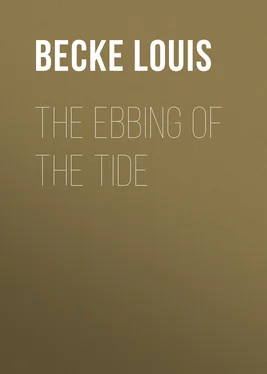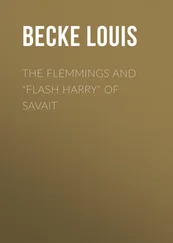Louis Becke - The Ebbing Of The Tide
Здесь есть возможность читать онлайн «Louis Becke - The Ebbing Of The Tide» — ознакомительный отрывок электронной книги совершенно бесплатно, а после прочтения отрывка купить полную версию. В некоторых случаях можно слушать аудио, скачать через торрент в формате fb2 и присутствует краткое содержание. Жанр: foreign_prose, literature_19, foreign_antique, на английском языке. Описание произведения, (предисловие) а так же отзывы посетителей доступны на портале библиотеки ЛибКат.
- Название:The Ebbing Of The Tide
- Автор:
- Жанр:
- Год:неизвестен
- ISBN:нет данных
- Рейтинг книги:5 / 5. Голосов: 1
-
Избранное:Добавить в избранное
- Отзывы:
-
Ваша оценка:
- 100
- 1
- 2
- 3
- 4
- 5
The Ebbing Of The Tide: краткое содержание, описание и аннотация
Предлагаем к чтению аннотацию, описание, краткое содержание или предисловие (зависит от того, что написал сам автор книги «The Ebbing Of The Tide»). Если вы не нашли необходимую информацию о книге — напишите в комментариях, мы постараемся отыскать её.
The Ebbing Of The Tide — читать онлайн ознакомительный отрывок
Ниже представлен текст книги, разбитый по страницам. Система сохранения места последней прочитанной страницы, позволяет с удобством читать онлайн бесплатно книгу «The Ebbing Of The Tide», без необходимости каждый раз заново искать на чём Вы остановились. Поставьте закладку, и сможете в любой момент перейти на страницу, на которой закончили чтение.
Интервал:
Закладка:
Brave Ninia, leaning her lithe figure well over the side of the canoe, plunged her paddle deep down and tried to bring the canoe head to wind to meet the danger, and Ruvani, in the bow, with long hair flying straight out behind her, answered her effort with a cry of encouragement, and put forth all her strength to aid.
But almost ere the cry had left her lips, the full fury of the squall had struck them; the canoe was caught in its savage breath, twirled round and round, and then filled.
“Keep thou in the canoe, little one, and bale,” cried Ninia to Tarita, as she and Ruvani leaped into the water.
For some minutes the two girls clung with one hand each to the gunwale, and Tarita, holding the large wooden ahu or baler, in both hands, dashed the water out. Then she gave a trembling cry—the baler struck against the side of the canoe and dropped overboard.
Ninia dared not leave the canoe to seek for it in the intense darkness, and so clinging to the little craft, which soon filled again, they drifted about. The waters of the lagoon were now white with the breaking seas, and the wind blew with fierce, cruel, steadiness, and although they knew it not, they were being swept quickly away from the land towards the passage in the reef.
The rain had ceased now, and the water being warm none of them felt cold, but the noise of the wind and sea was so great that they had to shout loudly to each other to make their voices heard.
Presently Ruvani called out to Ninia—
“Let us take Tarita between us and swim to the shore, ere the sharks come to us.”
“Nay, we are safer here, Ruvani, And how could we tell my mother that the canoe is lost? Let us wait a little and then the wind will die away.”
Canoes are valuable property on Pingelap, where suitable wood for building them is scarce, and this was in Ninia’s mind.
They still kept hold of their paddles, and although afraid of the sharks, waited patiently for the storm to cease, little thinking that at that moment the ebbing tide and wind together had swept them into the passage, and that they were quickly drifting away from their island home.
All that night Ninia the widow and her four slaves sought along the beach of Tugulu for the three girls, who they felt sure had landed there. And when the day broke at last, and they saw that the gale had not ceased and that the canoe had vanished, they ran all the way over to the village, and Ninia threw herself at Sralik’s feet.
“Thy granddaughter and my children have perished, O chief.”
The chief came to the door of his house and looked out upon the wild turmoil of waters.
“It is the will of the gods,” he said, “else had not my whaleboat been crushed in the night,” and he pointed to the ruins of the boat-shed upon which a huge cocoanut tree had fallen and smashed the boat.
Then he went back into his house and covered his face, for Ruvani was dear to his savage old heart.
And Ninia went back to her lonely house and wept and mourned for her lost ones as only mothers weep and mourn, be they of white skins or brown.
Away out into the ocean the canoe was swept along, and Ruvani and Ninia still clung to her, one at the head and one at the stern. Once there came a brief lull, and then they succeeded in partly freeing her from water, and Tarita using her two hands like a scoop meanwhile, the canoe at last became light enough for them to get in.
They were only just in time, for even then the wind freshened, and Ninia and Ruvani let the canoe run before it, for they were too exhausted to keep her head to the wind.
When daylight broke Ninia, with fear in her heart, stood up in the canoe and looked all round her.
There was no land in sight! Poor children! Even then they could not have been more than twenty miles away from the island, for Pingelap is very low and not visible even from a ship’s deck at more than twelve or fifteen miles.
But she was a brave girl, although only fourteen, and when Tarita and Ruvani wept she encouraged them.
“Sralik will come to seek us in the boat,” she said, although she could have wept with them.
The wind still carried them along to the westward, and Ninia knew that every hour was taking them further and further away from Pingelap, but, although it was not now blowing hard, she knew that it was useless for them to attempt to paddle against it. So, keeping dead before the wind and sea, they drifted slowly along.
At noon the wind died away, and then, tired and worn out, she and Ruvani lay down in the bottom of the canoe and slept, while little Tarita sat up on the cane framework of the outrigger and watched the horizon for Sralik’s boat.
Hour after hour passed, and the two girls still slept. Tarita, too, had lain her weary head down and slumbered with them.
Slowly the sun sank beneath a sea of glassy smoothness, unrippled even by the faintest air, and then Ninia awoke, and, sitting up, tossed her cloud of dark hair away from her face, and looked around her upon the darkening ocean. Her lips were dry and parched, and she felt a terrible thirst.
“Tarita,” she called, “art sleeping, dear one?”
A sob answered her.
“Nay, for my head is burning, and I want a drink.”
The whole story of those days of unutterable agony cannot be told here. There, under a torrid sun, without a drop of water or a morsel of food, the poor creatures drifted about till death mercifully came to two of them.
It was on the evening of the second day that Ninia, taking her little sister in her own fast weakening arms, pressed her to her bosom, and, looking into her eyes, felt her thirst-racken body quiver and then grow still in the strange peacefulness of death. Then a long wailing cry broke upon the silence of the night.
How long she had sat thus with the child’s head upon her bosom and her dead sightless eyes turned upward to the glory of the star-lit heavens she knew not; after that one moaning cry of sorrow that escaped from her anguished heart she had sat there like a figure of stone, dull, dazed, and unconscious almost of the agonies of thirst. And then Ruvani, with wild, dreadful eyes and bleeding, sun-baked lips, crept towards her, and, laying her face on Ninia’s hand, muttered—
“Farewell, O friend of my heart; I die.”
And then, as she lay there with closed eyes and loosened hair falling like a shroud over the form of her dead playmate, she muttered and talked, and then laughed a strange weird laugh that chilled the blood in Ninia’s veins. So that night passed, and then, as the fiery sun uprose again upon the wide sweep or lonely sea and the solitary drifting canoe with its load of misery, Ruvani, who still muttered and laughed to herself, suddenly rose up, and with the strength of madness, placing her arms around the stiffened form of little Tarita, she sprang over the side and sank with her.
Ninia, stretching her arms out piteously, bowed her head, and lay down to die.
She was aroused from her stupor by the cries of a vast flock of sea birds, and, opening her eyes, she saw that the canoe was surrounded by thousands upon thousands of bonita that leaped and sported and splashed about almost within arm’s length of her. They were pursuing a shoal of small fish called atuli , and these every now and then darted under the canoe for protection. Sometimes, as the hungry bonita pressed them hard, they would leap out of the water, hundreds together, and then the sea birds would swoop down and seize them ere they fell back into the sea.
Ninia, trembling with excitement and the hope of life, watched eagerly. Presently she heard a curious, rippling noise, and then a rapidly-repeated tapping on the outrigger side of the canoe.
Oh! the joy of it; the water was black with a mass of atuli crowded together on the surface, and frightened and exhausted.
Читать дальшеИнтервал:
Закладка:
Похожие книги на «The Ebbing Of The Tide»
Представляем Вашему вниманию похожие книги на «The Ebbing Of The Tide» списком для выбора. Мы отобрали схожую по названию и смыслу литературу в надежде предоставить читателям больше вариантов отыскать новые, интересные, ещё непрочитанные произведения.
Обсуждение, отзывы о книге «The Ebbing Of The Tide» и просто собственные мнения читателей. Оставьте ваши комментарии, напишите, что Вы думаете о произведении, его смысле или главных героях. Укажите что конкретно понравилось, а что нет, и почему Вы так считаете.












